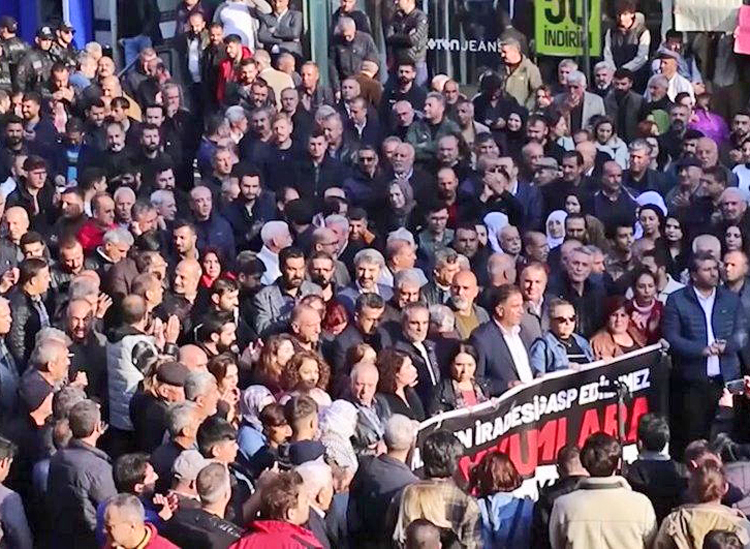Long-time President Recep Tayyip Erdogan is looking beyond Turkey to see how in today’s unsettled world he can best defend the interests of Turkey’s capitalist rulers, as well as his own position. He is trying to balance between Washington and Moscow as military conflicts from Ukraine to the Middle East threaten wider clashes and breed deepening instability.
As shifting international alignments pull at the U.S.-dominated imperialist world order, Erdogan looks to strengthen Ankara’s political and economic position in the region and beyond.
He has renewed his decadeslong assault on the Kurdish people, in Turkey and throughout the area. The 30 million Kurds spread across Turkey, Iran, Iraq and Syria are looking for a road to advance their national rights as the world’s largest nationality without their own state.
Erdogan was the sole member of the U.S.-led NATO alliance to attend the recent expanded conference in Russia of BRICS, named after its founding members — Brazil, Russia, India, China and South Africa. Moscow and Beijing try to use this bloc in their conflicts with Washington. Erdogan attended to seek openings to advance Ankara’s interests more broadly.
Driven by a deep economic crisis at home, Erdogan is trying to boost Turkey’s status as a power broker bridging Europe and Asia. With Moscow’s influence in Central Asia undermined by its invasion of Ukraine, Erdogan is pushing to revitalize ties with the historically Turkic nations there. He just returned from a trip to Kyrgyzstan.
He is also looking to mend relations with former foes, from Saudi Arabia to Egypt. He has sharply curtailed relations with Israel, while hailing Hamas as a heroic “liberation” group.
Kurdish national aspirations
One key challenge for Erdogan, and other capitalist rulers in the region, is the national aspirations of the Kurdish people. In the late 1970s the Kurdistan Workers’ Party (PKK) was formed, led by Abdullah Ocalan. The PKK won widespread support in the Kurdish region, and in Turkey’s largest city, Istanbul, where 2 million Kurds live. Facing fierce repression, the group began a campaign of terror, and the regime responded in kind.
Ocalan was captured in 1999 and received a death sentence, which was commuted to life in prison three years later. He is still behind bars.
Mass popular protests broke out against the dictatorial regime of Bashar al-Assad in Syria in 2011, which were met with bloody slaughter by the government. This led to a far-reaching civil war, and to an uprising by Kurds across a swath of northern Syria near the Turkish border.
The Assad regime survived by the intervention of armed forces provided by Moscow and Tehran.
The Kurds in Syria, led by the Democratic Union Party (PYD), whose leadership looks to the PKK, carved out an autonomous region where they continue to rule. The Turkish regime views this as a dangerous threat that gives hope to Kurds seeking autonomy inside Turkey. Ankara has carried out military operations against the PYD ever since.
In late October, Turkish airstrikes hit Kurdish targets in neighboring areas of northeastern Syria and northern Iraq. Scores of people were killed or injured and infrastructure destroyed. This latest offensive followed a deadly attack Oct. 23 on the government-run Turkish Aerospace Industries by the PKK, killing five people and injuring 22.
Some 900 U.S. soldiers are stationed in northeastern Syria, which includes most of that country’s oil fields, to protect Washington’s strategic interests.
Economic, social disruptions
The assault on the aerospace plant — and Ankara’s deadly response — occurred a day after a surprise announcement. On Oct. 22 Devlet Bahceli, leader of the Turkish Nationalist Movement Party, an ally of Erdogan’s, had called for Ocalan to be allowed to come and address the Turkish parliament if he would end the PKK’s war. Ocalan’s nephew, Omer Ocalan, was allowed to visit him in prison, his first family visit in four and a half years..
Omer Ocalan, who is a member of the Peoples’ Equality and Democracy Party in Turkey’s parliament, got a message from his uncle saying he was prepared to discuss ending the long-running conflict. Erdogan said he welcomed this “historic window of opportunity.”
At the same time, Erdogan turned up the heat against pro-Kurdish opponents. The Turkish interior ministry charged three Kurdish town mayors with “terrorism” — that is, support for the PKK — and replaced them with regime trustees Nov. 4. Thousands in the mainly Kurdish areas of Turkey mounted protests, which the police attacked with water cannons. A number of Peoples’ Equality and Democracy Party representatives, some of whom won significant victories against Erdogan’s party in March municipal elections, have been arrested.
The Turkish economy has faced double-digit inflation since 2017, with almost 50% in September alone. In the last 10 years, the Turkish lira lost 1,400% of its value against the U.S. dollar. This has caused a worsening social crisis hitting millions of working people facing rocketing prices for food and fuel.
It is against the backdrop of this social crisis and recent developments that Erdogan and Turkey’s capitalist rulers are looking for openings internationally to advance their position.
At the same time, sanitation workers in Istanbul, members of the Confederation of Progressive Trade Unions of Turkey, went on strike Nov. 4. Residents organized to remove some of the rotting garbage while making it clear they support the striking workers.


